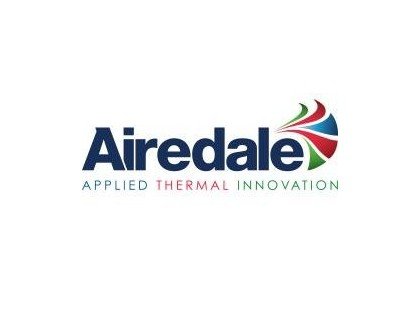With chilly weather that is likely to be sticking around for the next few weeks, now is the time to ensure that a user doesn’t get caught out by having planned, preventative maintenance on their HVAC Chillers. Here are six key preventative chiller maintenance tips from Airedale International Air Conditioning’s UK Service Manager, Adrian Trevelyan, to help maintain high efficiency, maximize resilience and uptime, and improve the longevity of the user’s air conditioning chiller during the winter months.
- Maintain glycol levels
Once temperatures drop below zero, the water in chilled water systems can freeze and potentially cause thousands of pounds worth of damage. Ethylene glycol is the most common chemical used to combat freezing in chillers. The amount of glycol that is need in the system should be specified in the documentation issued with the unit; these levels should be checked and maintained on a regular basis during the cold snap.
- Clean coils
Did you know free cooling chiller coils and condenser fans work harder during the coldest spells? With exposure to the harsh winter conditions; a chiller coil or heat exchanger attracts mold, dirt, pollutants and other airborne contaminants. This build-up accumulates gradually, but over time, a dirty coil can reduce airflow drastically. For each 10% reduction in airflow, the efficiency of the chiller drops about 5%. By keeping the coils clean even just by simply brushing away the winter debris can improve energy efficiency. A 10% reduction in airflow can result in the efficiency of the chiller dropping by 5%.
- Check trace heating
Trace heating is used in chillers to protect pipes from freezing, visually checking the trace heating tape for any damage or corrosion, including connections, will ensure there’s no failure and risk of the pipes freezing. If insulation does get damaged, faults to earth can be an issue. Check the MCB’s have not tripped. When doing any electrical checks, one must ensure this is carried out by a suitably qualified engineer with the correct test equipment.
- Unblock strainers
Scale, corrosion, biofilm, weld slag, dirt, iron oxides, and suspended solids can cause serious operational problems when trapped in strainers. Blocked strainers will cause pipe blockages, failed pumps and then potential freeze issues. Prevent this harmful clogging by cleaning the strainers regularly.
- Look out for pipe fractures
HVAC piping encompasses many different fluids, pressures, and temperatures. As mentioned previously if piping is damaged or fractured as a result of changes to weather conditions and low glycol levels, piping can burst and cause unwanted leaks. Give a system a frequent winter health check and spot those pipe fractures and take remedial action before it’s too late.
- Create a contingency plan
All businesses are vulnerable to unforeseen incidents that can stop or impair normal operations. Chillers are a critical part of any site’s infrastructure and are subject to testing conditions, often being exposed to the elements and running for the majority of the year. A robust maintenance strategy can help to avoid unplanned downtime but should the worst happen, it is important to have a formal contingency plan to ensure the business is not unduly impacted.
business critical environments
Airedale offer a HVAC rental service and for total piece of mind we offer a contingency plan package that encompasses initial survey, identifies suitable equipment with detailed site specific instructions, and is delivered with a guaranteed response time nationwide. Knowing that one has immediate help on hand, day or night, is reassuring when they are responsible for the cooling systems that are keeping critical infrastructure running 24/7.
Planned maintenance not only assists in preventing unit breakdowns in business critical environments, but also helps to improve energy efficiency and enhance system optimization for improved performance. Rewards include reduced running costs, quicker payback periods and potentially longer life, plus less carbon emissions.

















